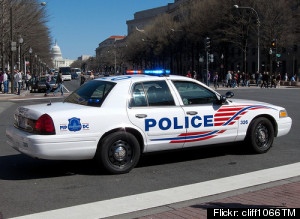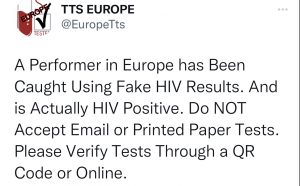One message emerging from the recent AIDS 2012 Conference in Washington, D.C., was that an AIDS-free generation is within sight, if only we muster the will to do what must be done. But a new report by Human Rights Watch (HRW) shows that the best educational efforts and universal access to treatment will not suffice if public health policies are undermined by police.
HRW found incidents of condom-related harassment of suspected sex workers by police in six of D.C.’s seven police districts. Several women, including transgender sex workers, say they were stopped and searched by police, who accused them of prostitution upon finding condoms in their possession (which, it should be noted, is legal). Further police actions ranged from ordering the women to throw condoms away to requesting sexual favors to stomping on their wigs. These abuses are unlikely to show up in officers’ incident reports.
Such actions violate General Order PCA-501.02, which states that MPD policy “is to interact with the transgender community in a manner that is professional, respectful, and courteous.” They also hamper efforts by the group HIPS (Helping Individual Prostitutes Survive), whose Mobile Services Van distributes condoms and provides new syringe access to sex workers. HIPS outreach director Jenna Mellor told HRW, “Clients take fewer condoms than they need because they fear the police.”
David Catania, openly gay chairman of the D.C. Council Committee on Health, cited a Metropolitan Police Department official in denying the problem: “Assistant Chief Peter Newsham will tell you that that’s like an urban myth. … [In] our conversation at D.C. courts, there’s not been a single documented case of condoms being used as evidence of prostitution in recent years. Not one.”
There is a disconnect here. HRW itself acknowledges that “most stops reported to Human Rights Watch consisted of police questioning, searching, and demands to ‘move along’ without resulting in an arrest.” Indeed, Prostitution Free Zones are under legal review due to constitutional concerns, despite their not involving arrests.
At the same time, HRW states:
Newsham expressed concern that the police were discouraging the use of condoms among sex workers or any other member of the public. He said that condoms could be used as supplemental evidence collected “incident to arrest.” … [He] expressed his concern that police were “editorializing” about condoms in a manner that conveyed a threat to arrest sex workers for possession of condoms. Newsham agreed to consider issuing guidelines prohibiting such commentary and to underscore for MPD officers the importance of encouraging condom use.
Newsham’s statement offers some reassurance, but past experience with overzealous officers suggests that revised protocols and training will not be enough. The law must be changed, as HRW recommends, to prohibit police from using condoms as evidence of prostitution.
The accounts by transgender sex workers, who are often driven into prostitution by discrimination, reveal that many police officers treat them as less than human. This is not only disgraceful and illegal, but it shows a reckless disregard for public health and safety. Marginalizing a population and denying it protections enjoyed by others only injects poison into society. Who do the police think hires these women? Other sex workers? When some lives are devalued, all live in greater hazard.
Like the war on drugs, the war on prostitution is not only doomed to fail, but it does harm. I realize that politicians are not about to decriminalize prostitution anytime soon, but at least they can revise the law to prohibit police practices that undermine their cities’ public health efforts, which include condom availability for HIV prevention.
Denial of a problem is a common obstacle to action. Let’s put a wrapper on that.
Source. Huffingtonpost.com






